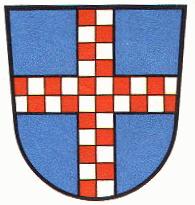Limburg (kreis): Difference between revisions
Jump to navigation
Jump to search
Knorrepoes (talk | contribs) m (Text replacement - "{{de}}" to "") |
Knorrepoes (talk | contribs) m (Text replacement - "{| class="wikitable"↵|+Official blazon↵|-↵|'''German'''↵| ↵|-↵|'''English''' ↵| {{blazon wanted}}↵|}" to "{| class="wikitable" |+Official blazon |- |'''German''' | blazon wanted |- |'''English''' | blazon wanted |}") |
||
| Line 12: | Line 12: | ||
|- | |- | ||
|'''German''' | |'''German''' | ||
| | | blazon wanted | ||
|- | |- | ||
|'''English''' | |'''English''' | ||
| | | blazon wanted | ||
|} | |} | ||
Revision as of 07:07, 6 April 2023
LIMBURG (LM)
State : Hessen
Incorporated into : 1975 Limburg-Weilburg
| German | blazon wanted |
| English | blazon wanted |
Origin/meaning
The arms were granted on June 28, 1957.
The cross on the one hand symbolises St. George, the patron saint of the large cathedral in Limburg an der Lahn, and on the other hand the State of Trier. The bishops of Trier acquired gradually the whole district in the 14th century. The small squares on the cross are derived from the arms of the 15th century Counts of Limburg, who used a chequered bar in their arms.
Literature: Stadler, 1964-1971, 8 volumes.
